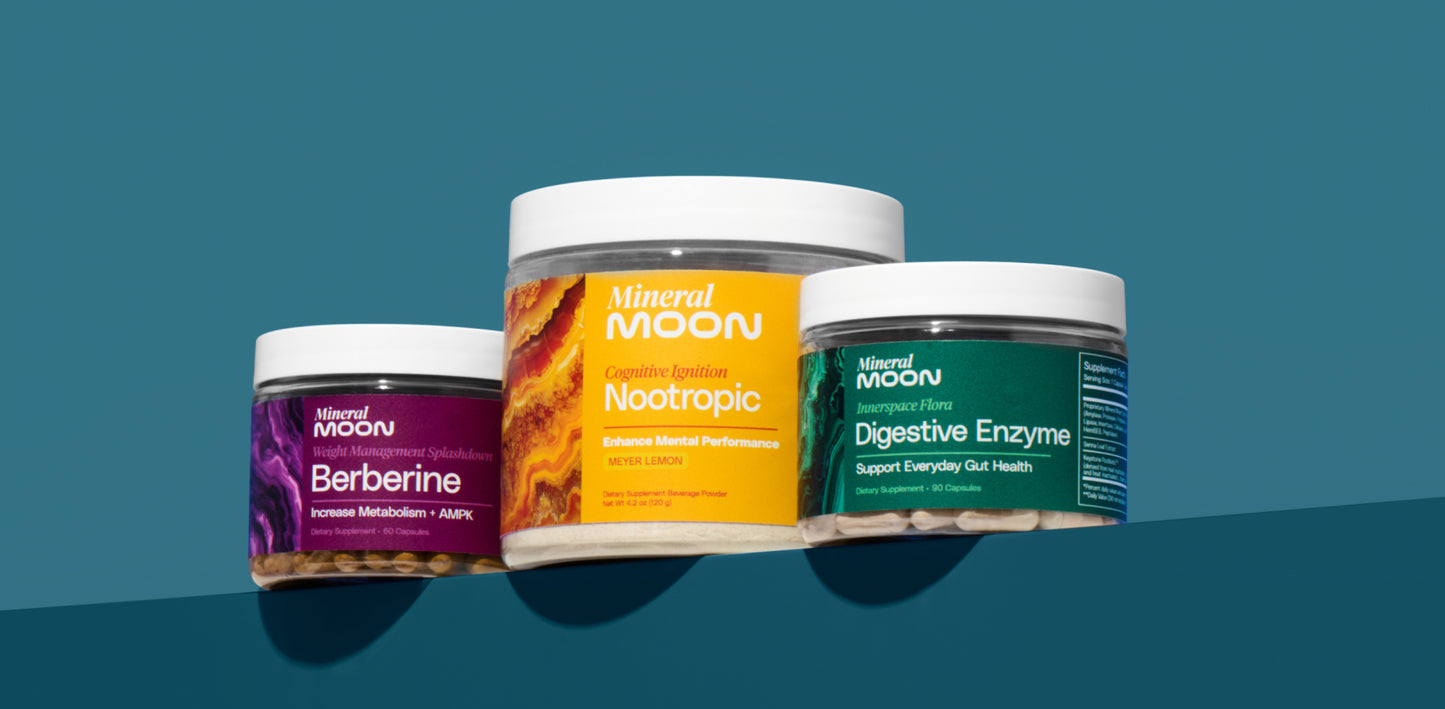What is Berberine and Why It Works
In the world of natural supplements, few ingredients have gained as much attention as Berberine. Often referred to as nature’s metabolism booster, Berberine has been used for centuries in traditional medicine. But how does it work, and why should you consider adding it to your wellness routine? Let’s explore the origins, Berberine benefits, and the science behind Mineral Moon’s Berberine, a next-generation formula designed to support your metabolic health.
What is Berberine?
Berberine is a bioactive compound found in several plants, including Berberis aristata (Indian barberry), Coptis chinensis (goldthread), and Phellodendron amurense (Amur cork tree). Traditionally used in Ayurvedic and Chinese medicine, Berberine has long been valued for its ability to support digestive health, regulate blood sugar, and enhance cardiovascular function.
In recent years, research has uncovered Berberine’s profound effects on metabolism, making it a popular choice for those seeking natural support for weight management and metabolic health. Many people compare Berberine vs Metformin due to their similar effects on blood sugar regulation, but Berberine offers a plant-based alternative with additional health benefits.
How Does Berberine Work?
The key to Berberine’s effectiveness lies in its ability to activate AMPK (Adenosine Monophosphate-activated Protein Kinase)—often referred to as the “metabolic master switch.” AMPK plays a crucial role in energy balance, fat oxidation, and glucose metabolism. When activated, it helps:
- Boost metabolism by increasing cellular energy production
- Promote fat burning and reduce fat storage
- Support healthy blood sugar levels by improving insulin sensitivity
Mineral Moon’s Advanced Berberine Formula
Not all Berberine supplements are created equal. Mineral Moon’s Berberine Phytosome stands out due to its superior bioavailability—offering up to 10X better absorption than standard Berberine supplements. This is made possible by its unique phospholipid coating derived from natural pea, ensuring your body fully utilizes its benefits.
Additionally, the Mineral Moon Berberine is enhanced with CQR-300® (Cissus Quadrangularis Extract), a clinically studied compound known for its ability to regulate appetite and support Berberine for weight loss.
What is CQR-300® and How Does It Help?
CQR-300® is a patented extract derived from Cissus Quadrangularis, a plant widely used in traditional African and Indian medicine. This powerful ingredient works as an enzyme inhibitor, specifically protecting GLP-1 (Glucagon-like Peptide-1) from degradation by DPP-4 (Dipeptidyl Peptidase-4).
GLP-1 is a crucial hormone for weight management, as it:
- Regulates appetite and promotes satiety
- Enhances insulin secretion, improving blood sugar control
- Reduces food cravings, making it easier to maintain a healthy diet
Best Berberine Supplement: Why You Need Berberine in Your Daily Routine
Whether your goal is to use Berberine for weight loss, blood sugar balance, or overall metabolic health, Mineral Moon’s Berberine is a natural, research-backed solution. Here’s why it should be part of your wellness routine:
- Supports healthy metabolism and fat oxidation
- Enhances insulin function and promotes balanced blood sugar levels
- Helps control appetite and food cravings
- Offers superior absorption with Phytosome technology
When to Take Berberine
For optimal results, Berberine is typically taken before meals to help regulate blood sugar spikes and support digestion. Many experts recommend splitting the dosage throughout the day—morning, afternoon, and evening—to maintain stable blood sugar levels and enhance its benefits. However, individual responses vary, so consulting a healthcare professional is always advised.
Side Effects of Berberine: Is It Safe?
While Berberine is generally well-tolerated, some individuals may experience mild side effects such as digestive discomfort, bloating, or nausea. These effects are typically temporary and can be minimized by starting with a lower dose and gradually increasing it.
Can Berberine Damage the Liver or Kidneys?
There is no strong evidence suggesting that Berberine damages the liver or kidneys when taken in appropriate doses. In fact, some studies indicate that Berberine may even offer liver-protective benefits. However, individuals with pre-existing liver or kidney conditions should consult their healthcare provider before using Berberine.
Is Berberine Safe During Pregnancy?
Pregnant and breastfeeding women should avoid taking Berberine, as it may cross the placenta and affect fetal development. Always consult a doctor before adding any new supplement to your regimen during pregnancy.
The Bottom Line
If you're looking for a science-backed approach to weight management and metabolic health, Mineral Moon’s Berberine with CQR-300® is your go-to supplement. With its cutting-edge formula and enhanced bioavailability, it provides the support your body needs to achieve lasting wellness.
Are you ready to optimize your metabolism and take control of your health? Try the Mineral Moon Berberine today!









